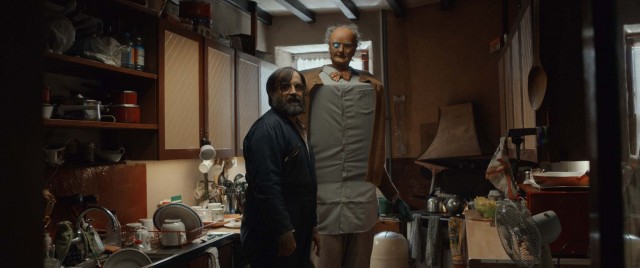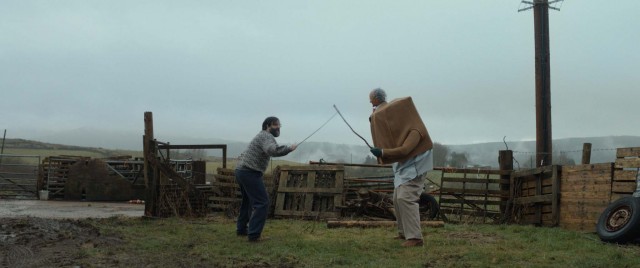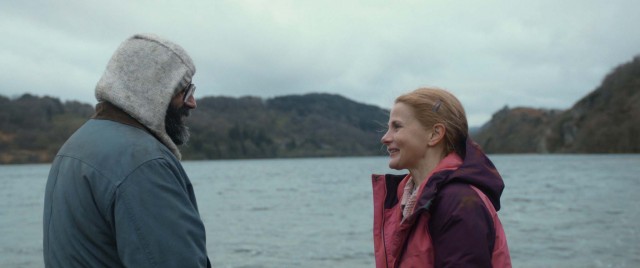Having made statements like ‘we are the launchpad for a new generation of filmmakers‘ and ‘short films are a great way to showcase your voice as a filmmaker and kickstart your filmmaking career‘ on this site, I think it’s always important that we back-up these claims with solid, physical proof. And what better way to do that, than by showcasing how directors featured on our site continue to impress with their career development and exciting new projects. Case in hand: Jim Archer and the feature development of 2017 short Brian and Charles.
When that short crossed our paths, almost five years ago now, we were instantly impressed by its unique brand of comedy, but I’d be lying if I claimed it was something we saw great development potential in. Yet here we are, early 2022 and the feature is set to premiere at this year’s Sundance Film Festival. Excited to find out more about what we can expect from his debut feature and discuss how they developed the short, we spoke to director Jim Archer, ahead of the film’s festival screening.
I haven’t had a chance to see Brian and Charles yet, but I’m really looking forward to it. The short is a big favourite with the team on Short of the Week and we’re excited to see how you expand it. For many people, their first exposure to your unusual double-act will be in the feature, which premieres at Sundance this year, but when the film began life as a short back in 2017 did you always envision it being developed into a larger project or was that something that happened more organically afterwards?
I don’t think we actually thought about it until we were shooting. We shot that film for around £500 in the Welsh countryside, a bunch of us just went to an Airbnb and shot it there. It was during that process we realised that we could be out here for three weeks and we’d have a feature. It didn’t feel that tricky
It was written by David Earl and Chris Hayward (who also star in the film) and I think when they wrote it they may have been thinking about it as a pilot for a TV show, but I don’t think we made any effort into developing it as a feature until we released it. Once it was out there people were just interested almost straight away and we then saw the potential for a feature. After that, Film4 were pretty early on to it and we got the commission.
So the short was important in getting the feature made?
Definitely. I don’t think we’d ever have made a film based on a script for Brian and Charles. Not that the concept and script aren’t great, but I just think it’s a difficult sell without seeing it. On the page, if you read about this guy with a robot, I think your brain just goes somewhere completely different. I think you’re always going to sell a project better if you’ve got a short film to show. So now, I think I would always do that for the future stuff as well

David Earl (L) and Chris Hayward reprise their roles as Brian and Charles in the feature.
That’s really good to hear, our audience are really interested in the journey from short to feature, especially as yours wasn’t originally envisioned as becoming a bigger project. You get a lot of shorts made nowadays that are made specifically for selling a bigger project, proof of concept shorts, so it’s refreshing to hear about a short that organically picked up a development deal. I can totally imagine how actually seeing Brian and Charles, getting to know the characters and their situation, was a huge plus in getting the film made.
You mentioned shooting in the rural Welsh countryside and this is where we’re introduced to Brian and Charles in the short. In that story, we learn that Brian was in this period of isolation and deep depression when he decided to make a robot after finding the head in the back of the barn. Looking at the synopsis for the feature, it seems to follow a similar path, but what can we expect from this new narrative and how was the process of developing that original concept into a feature-length piece?
I think the short probably does exist somewhere within the film, even if the specific story we told doesn’t happen in the feature, it could exist within the film, we just don’t have those scenes. The development started with us asking the question: “Is just the two of them enough for an entire 90 minutes?” Through that process, we realised we needed more characters and an antagonist. Maybe there’s some kind of love triangle with Brian and Charles and another woman? We brought in a few extra elements but still tried to keep it quite simple.
“We came back to the short and saw that the original story was right”
We went through a fair few different iterations where we went a bit too far away from the original idea, where Charles became something that Brian didn’t create. I think we used to believe that maybe the fun thing was their relationship and how Charles was and it didn’t quite matter that Brian made him. But then, as we sort of circled around it, we came back to the short and saw that the original story was right. He gets lonely and he builds this thing and the fact he does that is so important in representing his loneliness. From there we focused on what’s going to hold an audience’s interest for 90 minutes, added a few extra bits and bobs, but essentially the core of the story is still the same. It’s this weird relationship between a man and a robot.
And the actors playing Brian and Charles, they’re still the same?
David is still Brian. Chris is still Charles. And Rupert (Majendie), who often did the voice for Charles on the laptop on set, is still producing. We tried to very much keep to the tone and feel of how we made the short, which is tricky when you’ve got a much bigger crew, so we tried to maintain a slightly relaxed and homemade feel throughout.
Sounds like it would have made for a good experience on set. Watching the short back earlier, I was really surprised by how topical it felt, with the themes of loneliness and depression, probably something a lot of people have obviously experienced over the last couple of years with the COVID situation. When developing Brian and Charles the feature, did pandemic experiences have any influence there?
I think our final script was locked in 2019, so it was all coincidental and I don’t think we recognised the topical nature of the themes until we actually started shooting the feature, which was in December 2020. We were originally meant to shoot the film the day that the first lockdown happened here in the UK. Actually, that day was our first day of shooting, we were up in Wales on a tech recce and just slowly realised, as that day went on, that it wasn’t going to happen.
“As a weird, indie comedy, you think it would be the first on the chopping block”
At the end of the day, we went to the hotel room of our line producer, with all the crew who were with us, he just laid out loads of bottles of red wine and we knew: “Okay, we’re not making the film now”. But it was okay, everyone was still in high spirits. So then we shot in November, the same year and the BFI and Film4 were really supportive. I was quite nervous, as I assumed companies like that will be losing money and may have to shelve some films, so I thought we’d be the first to go. As a weird, indie comedy, you think it would be the first on the chopping block, but they were really reassuring. The BFI even gave the crew an extra payment to tie them over during lockdown, which was amazing of them and really unprecedented. I feel very lucky that we had public funders like that involved.
Did that delay in shooting help at all? I spoke to some other filmmakers recently and they were in the middle of their shoot and had to shut down for a bit. They were obviously disappointed, but also said that the extra time helped them to focus on some of the other aspects of the filmmaking process again. Was there any kind of upside like that with your postponement?
I guess so, I mean the weather was definitely one. It was amazing in April in the first month of lockdown and that is just not the tone of this film, as it’s sort of set around November, December. Aesthetically, it was much better, but also it gave us more time, there were things that I was kind of nervous about heading into the shoot, sections where I wasn’t sure we were fully planned for that. I don’t think you ever lose that feeling though and even when we had seven months to plan, it still felt scary to be going into it. I don’t think you ever feel fully prepared.

Brian and Charles was filmed in rural Wales
As I mentioned earlier, in the short film world there’s a real interest in filmmakers that have made the jump to feature filmmaking, especially when it’s with the same narrative and that original short wasn’t made as a proof-of-concept. With that in mind, I wondered if you had any kind of insight into your short to feature journey, how did you go about making it happen, how long did it take, how did you get funding?
I think it’s interesting how people make shorts with the intention of them being features, which I think is smart, I’ve got another film in development from a short. However, I think it’s really important the short has to be its own thing and to try not to have too much of an eye on the feature, because I think that can come across sometimes. Audiences respond to a beginning, middle and end and the short doesn’t have to be exactly like your feature, but as long as you’ve got some kind of concept, tone or style there, and a bit story.
In terms of the process, once we released it, we sent it to Film4 as Rupert, our producer, had some contacts there. From there it was pretty fast, they commissioned a treatment, or an outline, and then a script got commissioned. So we were all set Film4 wise in 2019, but they had given us half the money and we needed to find the other half. We’d always been interested in getting the BFI involved, but for the BFI you really do have to just apply through the system with everyone else, no matter what film you are.
“We tried to shoot within three months and then a pandemic happened, which you might have heard about”
And obviously, that was expected for us, but it’s interesting that all these much bigger films did the same thing. You apply and then you wait six weeks and I wasn’t sure if they would bite with it, because again, it’s weird, but they really responded. Mary Burke at BFI, who’s now not there anymore, was really keen to make more British comedy and I think we lucked out that she was involved. Then BFI came onboard, and as soon as that happened we were ready to going into production. We tried to shoot within three months and then a pandemic happened, which you might have heard about.
Yeah, I heard a little something about that! So in terms of backers, it was just Film4 and BFI?
There was another company called Great Point Media, who gave us a little bit of extra, but yeah, mostly those two.
Ok, so moving on to the production, as a director we know your work from short film and you’ve also done some television, but Brian and Charles is your first feature. So I’m just wondering, how did that experience differ? What’s the difference between shooting a short and feature? Apart from the fact that it’s obviously longer, I have it in my head from some other interviews I’ve done with directors that with a short film, there’s a little bit more freedom as you don’t have some of the expectations. Was that the case? Did you feel more pressure?
I definitely felt more pressure and I would say there’s more freedom with a short, but I don’t always think that freedom is the best thing. I think a lot of people spend too much time on shorts sometimes, I know when I was starting I was the same. I was editing 10-minute shorts for two months! With the feature we had a four-month edit, which is actually quite long for something like this. It was a four-week shoot and a four-month edit.
I think we still had a lot of freedom on the Brian and Charles feature though, especially compared to TV. We asked to extend the edit by a month and the reply was: “Yep, fine, do it”. Film4 and BFI were really involved, but they never put their foot down about anything. They trusted us, all their notes were really helpful and they guided us very gently, so it still felt like our thing. Rupert, Chris, David and I were the main people focused on how this film would come out. I’m sure that’s not an experience that is common to every film though.

Brian and Charles will premiere at Sundance Film Festival 2022
And now the film is complete and we’re talking to you ahead of its Sundance screening, which of course, we’re very sad isn’t happening in person, but getting into Sundance must be great validation for Brian and Charles. What does festival recognition like this mean for you and the film and what are the next steps, after Sundance, with Brian and Charles?
Like you said, it is essentially a huge validation for the film to be in Sundance. We’ve only screened it to friends and family, so this is our first indication that it might be okay. We got in quite early for Sundance, as they told us back in September that’s what, which was great as we realised: “Okay, well maybe this isn’t total crap then.” Because during the pandemic we couldn’t screen it to anyone.
We wanted to do tests, but we couldn’t do that, so the best we could do was just showing it to friends and they obviously have a very biased opinion. Sundance was always my number one festival, I’ve always sent shorts to Sundance, and never got in, but it felt like this film was a very Sundance film.
“I’d love a cinema release, at least in the UK, but who knows?”
As for next stages, we’ll find out. We’re screening to all the distributors, Bankside is a company that’s doing our sales, and they’re just holding everything back until Sundance, and then we’ll see. I’d love a cinema release, at least in the UK, but who knows? I’m very sad we’re not at Sundance in-person, because I only found out a few days ago we weren’t going and that’s one of the things I’m really going to miss, being present to find out whether the film was bought or not.
Well, fingers crossed we’ll hopefully hear more about the next steps for Brian and Charles after Sundance. I’m guessing a big portion of your immediate future will be taken up with press for Sundance and I’m sure you’ll be spending a lot of time on Zoom! But I was wondering, what else is taking up your time at the moment? What’s next for you and what future projects are you already working on?
I’ve got press for Sundance, but really just writing is next. I’ve got a film in development with a couple of friends and then some other film ideas. Brian and Charles has been my life for a year and a half, even though we weren’t working on it during the pandemic for six months, it still was the only thing I was focused on. Then we made it, edited it and post was six months. Following that, I went straight onto a TV show, which came from a pilot I’d made in 2018. I’m just finishing that now and I feel like I haven’t written anything for two years, and that’s what I want to do, is to write and direct my own stuff.
I loved directing Brian and Charles, because I felt like I had ownership having directed the short and then been involved in the development. The next thing is definitely finding a feature to write and direct, and it seems like that might happen, but if a script comes my way on the back of Brian and Charles, then that would also be exciting. I’m very much keeping my diary pretty clear at the moment.
 Rob Munday
Rob Munday